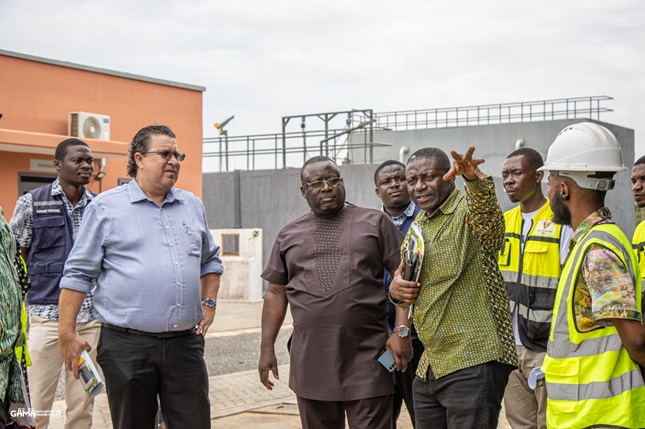The Country Director of the World Bank for Ghana, Pierre Laporte has commended the government’s efforts at promoting simplified sewerage systems within low-income urban communities in Ghana.
He said in addition to providing households and institutional toilet facilities as well as extension of piped water connections to low-income households, the government had demonstrated its commitment in bridging the infrastructural gap identified as one of the major challenges plaguing the sanitation and water resources sector.
He made the commendation during a familiarisation tour of the Ashaiman Simplified Sewerage Facility and Treatment Plant.
![]()
According to him, the project formed part of the World Bank’s numerous interventions which cuts across education, infrastructure, water, and sewerage which the World Bank had been implementing for many years.
After the tour of the facility with his team, Mr. Laporte expressed satisfaction at the success of the project, having served its purpose of impacting the poor and other areas where such facility is needed.
![]()
Project Coordinator of the Greater Accra Metropolitan Area (GAMA) sanitation project, George Asiedu for his part, said the inspection and satisfaction of Mr. Laporte was an indication of the success of the project which set the tone for future negotiations with the World Bank for other projects.
![]()
Touching on the proposed facility operation and management model, Mr. Asiedu said the intention was for the government to absorb the investment cost while the Ashaiman Municipal Assembly in partnership with a selected private operator, takes care of the daily operations and management of the plant.
He stated that beneficiary households would be billed monthly and proceeds would be used to settle operational expenditures and replacement of depreciating components of the plant.
The project has been one of the government-led World Bank funded in 2015. The primary objective is to improve sanitation, water supply, and environmental sanitation services in 2 metropolitan and 22 Assemblies in Greater Accra and Greater Kumasi.
As part of the project, 4 major drainage systems had been expanded to reduce flooding in Accra, while the capacities of thousands of government and civil society staff and a number of institutions had been built.
![]()
One other rare area in sanitation that the project ventured into, was the construction of two simplified sewerage systems in Ashaiman New Town in the Ashaiman municipality and Bankuman in the Tema metropolitan assembly.
The central objective of these interventions by the GAMA/GKMA Sanitation and Water Project is to increase access to improved sanitation in the Greater Accra and Greater Kumasi with focus on low-income urban communities and ensuring the disposal of treated effluent in a sustainable manner in order to minimise sanitation-related public health issues.
![]()

